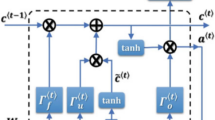Abstract
As information flow in the electronic online environment is increasing, the need for automated processing is increasing. Every minute, 456,000 tweets were written on Twitter. The data in the Mongolian language is already joined in that stream and created their own space since a long time ago. However, in the Mongolian language, there is a lack of research, language resources, and an implemented system by now. In this work, we tried to classify the document level sentiment polarity of Mongolian tweets based on the RNN method of deep learning. The model was tested at the 62,917 SemEval English data, the highest F1 score of 64.7.
Access this chapter
Tax calculation will be finalised at checkout
Purchases are for personal use only
Similar content being viewed by others
References
Wiebe, J., Wilson, T., Bruce, R., Bell, M., Martin, M.: Learning subjective language. Comput. Linguist. 30(3), 277–308 (2004)
Eisenstein, J.: What to do about bad language on the internet (2013)
Yan, J.L.S., Turtle, H.R.: Exploring fine-grained emotion detection in tweets (2011)
Pang, B., Lee, L., Vaithyanathan, S.: Thumbs up? sentiment classification using machine learning techniques. In: Proceedings of EMNLP-02 (2002)
Зoлжapгaл, M., Haнзaдpaгчaa, Д., Aлтaнгэpэл, Ч., Aмapcaнaa, Г.: Жиpгээний cэтгэгдлийг oлны xүчээp тэмдэглэx, үнэлэx acyyдaл (2018)
Dovdon, E., Saias, J.: ej-sa-2017 at SemEval-2017 task 4: experiments for target oriented sentiment analysis in twitter. In: Proceedings of the 11th International Workshop on Semantic Evaluation (SemEval-2017) (2017)
Baziotis, C., Pelekis, N., Doulkeridis, C.: DataStories at SemEval-2017 task 4: deep LSTM with attention for message-level and topic-based sentiment analysis (2017). https://aclweb.org/anthology/S17-2126
Cliche, M.: BB twtr at SemEval-2017 task 4: twitter sentiment analysis with CNNs and LSTMs (2017). https://aclweb.org/anthology/S17-2094
Hussein, D.M.E.D.M.: A survey on sentiment analysis challenges (2016)
Chilakapati, A.: Word bags vs word sequences for text classification (2019). https://xplordat.com/2019/01/13/word-bags-vs-word-sequences-for-text-classification/
Hochreiter, S., Schmidhuber, J.: Long short-term memory (1997). https://www.bioinf.jku.at/publications/older/2604.pdf
Olah, C.: Understanding LSTM networks (2015). https://colah.github.io/posts/2015-08-Understanding-LSTMs/
Young, T., Hazarika, D., Poria, S., Cambria, E.: Recent trends in deep learning based natural language processing (2018). https://arxiv.org/abs/1708.02709
Bojanowski, P., Grave, E., Joulin, A., Mikolov, T.: Enriching word vectors with subword information (2016)
Yin, Z., Shen, Y.: On the dimensionality of word embedding (2018)
Author information
Authors and Affiliations
Corresponding author
Editor information
Editors and Affiliations
Rights and permissions
Copyright information
© 2021 The Author(s), under exclusive license to Springer Nature Singapore Pte Ltd.
About this paper
Cite this paper
Ariunaa, O., Munkhjargal, Z. (2021). Sentiment Analysis for Mongolian Tweets with RNN. In: Pan, JS., Li, J., Namsrai, OE., Meng, Z., Savić, M. (eds) Advances in Intelligent Information Hiding and Multimedia Signal Processing. Smart Innovation, Systems and Technologies, vol 211. Springer, Singapore. https://doi.org/10.1007/978-981-33-6420-2_10
Download citation
DOI: https://doi.org/10.1007/978-981-33-6420-2_10
Published:
Publisher Name: Springer, Singapore
Print ISBN: 978-981-33-6419-6
Online ISBN: 978-981-33-6420-2
eBook Packages: Intelligent Technologies and RoboticsIntelligent Technologies and Robotics (R0)




